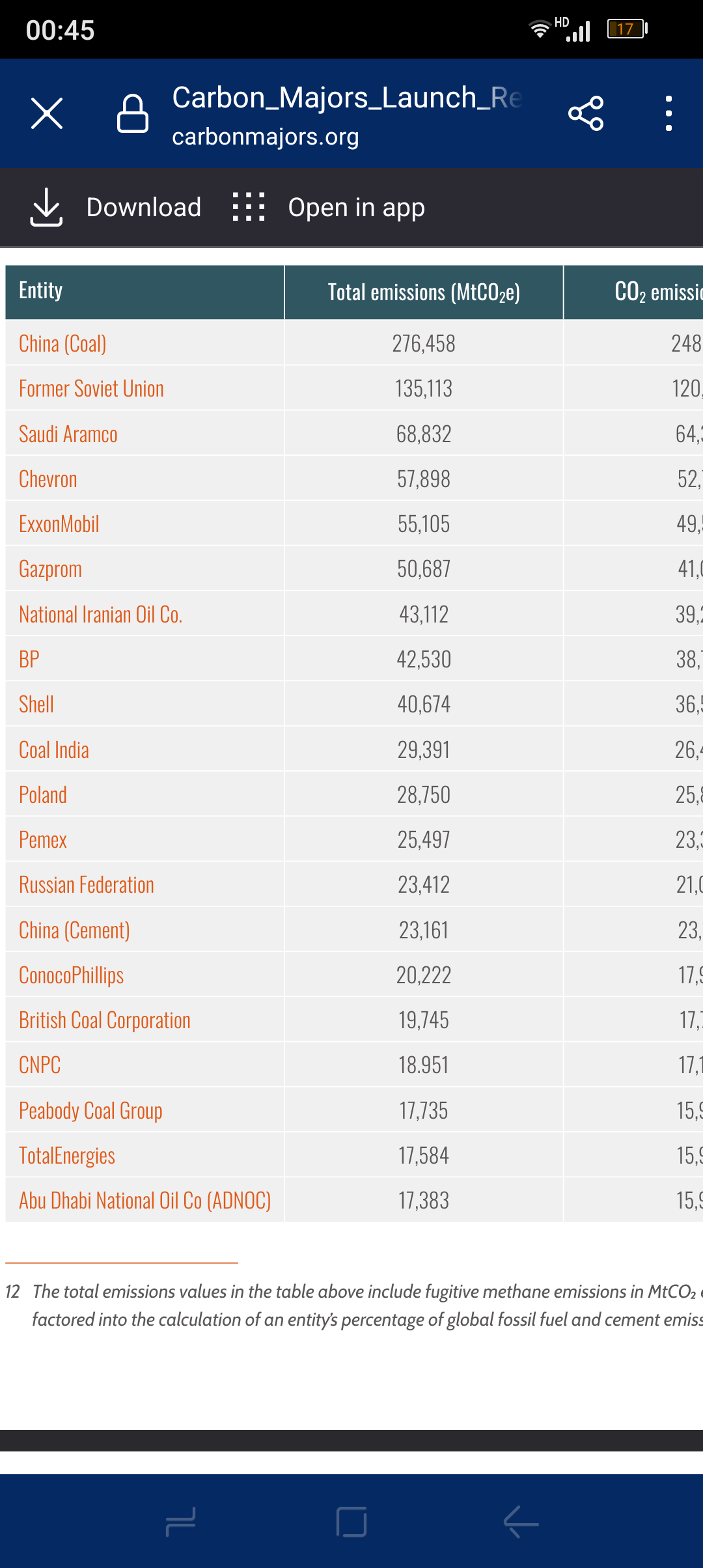This meme is so wrong it is deliberate misinformation. The Guardian made an article which is probably this meme’s source. It even linked to the original source, the Carbon Majors Report. But blatantly misquoted the CMR. For example, CMR says something like “100 fossil fuel producers responsible for 71% of industrial GHG emissions”, but The Guardian (and meme posters) omit the italic bits.
What do they mean with producers? Not companies like Apple or Heinz, but simply organizations which produce fossil fuels. Duh. Shell, BP, but also entities like China’s coal sector (which they count as one producer, although it consists of many entities). CMR also states 3rd type emissions are included. Which means emissions caused by “using” their “products”, e.g. you burning gasoline in your car.
So yes, the downvoted guy saying “Consumer emissions and corporate emissions are the same emissions” is pretty spot on in this case, albeit most likely by accident. Rejected not for being wrong, but for not fitting into a narrative, which I call the wrong reasons. Please check your sources before posting. We live in a post-factual world where only narratives count and truth is just another feeling, because of “journalism” and reposts like this. Which is the infuriating part in this particular case. I guess you want to spread awareness about the climate crisis, which is good, but you cannot do so by propagandizing science and spreading lies.
All that from the top of my head. Both the ominous TG article and the fairly short report are easy to find. In just a couple of minutes you can check and confirm how criminally misquoted it was.
There’s a second more obvious component that people neglect in any statement like OPs.
These companies exist because people buy their products. We can blame companies, but fossil fuel use is a collective problem.
Exactly. If you eat bananas that arrive in a port on a ship, that ship spewed out a lot of CO2. If everybody changed their habits and ate something locally grown instead, those emissions would not happen (but other emissions might happen instead). Every CO2 emission by a profit-driven company is going to be the result of a person buying one of their products.
We live in a society, and the amount of difference one person can make is pretty small. Often all of the options available to us are bad. But, this meme is worse.
The ridiculous aspect of this meme is that it shifts the blame onto companies, and allows people to pretend that their lifestyles and choices deserve none of the blame, and instead it’s just some evil companies that are ruining the world. The unfortunate fact is that in this modern society, if you’re living like a typical European or North American, even if you think of yourself as an environmentalist, your lifestyle probably results in a ton of CO2 emissions.
While you guys kind of have a point, the specific argument you put forward is rather weak. Transportation accounts for an almost negligible part of the overall emissions of a product. Bulk freight cargo is super efficient. If you want to moan about transportation emissions, look at single people sitting in tons of steel making short trips.
The point you still have is that emissions are caused in the process of satisfying a demand. Consumers do have a partial responsibility. However I would object in that the problem cannot be solved from the consumer’s position. It is a market failure. Markets have no incentive to internalize their externalities, that has to come from a different place; e.g. politics. Carbon pricing is an interesting mechanic, since it utilizes that same argument for good.
the specific argument you put forward is rather weak
I wasn’t claiming to pick the most environmentally destructive thing that people do. I was just picking a random, easy-to-understand thing that seems innocuous but still contributes to climate change. People know that driving cars is bad for the environment, but often don’t stop to consider that eating a banana could also be bad because of the shipping.
the problem cannot be solved from the consumer’s position
Not completely, but consumers can change their habits and make a significant dent in the problem. For example, “people sitting in tons of steel making short trips”. If people stopped driving, or at least significantly reduced it, that would have a real effect.
I’d argue that the problem can’t currently be solved by voting either. Yes, government regulation eventually has to be the answer, but right now there are too many people who would vote against that kind of a change, or who at least wouldn’t make it a priority. And, with all the fossil-fuel special interest money flowing into politics, even if it is a priority for a voter, there will often be elections where both major party candidates are in the pocket of the oil industry.
If people change their own personal habits (i.e. stop driving) that makes a small dent in the problem. But, it also motivates them to try to campaign, run for office and vote for other people who will make that kind of a change. If you stop driving you realize how much cities are geared around driving. How many hidden subsidies drivers get, etc. If you keep driving but just vote for candidates who talk a good game about carbon taxes, when they back down on those promises you sigh but you aren’t highly motivated to keep pushing.
I’m sorry, but this is just foolish and very naive.
Let me just buy some locally grown bananas, in the north… Or locally produced computer monitor…
It is totally up to the governments to regulate emissions, with regulations.
Now, WHAT governments are elected IS down to people, but unfortunately, caring about the environment is stil not a priority to prople (in part due to said governments being in the pockets of the biggest emission producers).
If I want a banana, I’ll get a banana. I will have no idea or information whether it’s shipped with the shittiest fuel burning ship, or an electric locomotive.
Now if the government regulated what fuel burning ships can enter the port, etc, etc, we’d have change. Fewer, more expensive bananas, of course (people will be unhappy about that), but at least the emissions would be reduced, with little to no change of the individuals’ habits.
Let me just buy some locally grown bananas, in the north…
That’s my point. You can’t. If you want to not be responsible for those CO2 emissions you have to eat something else.
It is totally up to the governments to regulate emissions, with regulations.
Sure, but you also have personal agency. You can choose to eat beets instead of bananas. You can choose to pay to have an old monitor fixed by a local repair shop instead of buying a new one. Instead, people use the lack of government rules as an excuse to continue to live the way they want to live. They choose to blame corporations for polluting instead of their own choices as consumers.
If I want a banana, I’ll get a banana. I will have no idea or information whether it’s shipped with the shittiest fuel burning ship, or an electric locomotive.
Yes, because you don’t want to know. You will never do that research. Admittedly, the research is hard to do. It’s hard to do a complete calculation of all the CO2 costs of the entire chain of events that results in a banana on sale at a local supermarket vs. a locally grown beet.
People could choose to try to do that research, but they don’t. It’s hard, and it’s depressing. Instead they’ll feel good about recycling an aluminum can, and never think about the environmental impact of driving around the city in a car.
And will people vote for stricter emissions laws and/or carbon taxes? Some people will, many people will vote against it. Many of the supporters will also not make it a priority. And, if the party that promised carbon taxes and/or stricter emissions wins but then gets lobbied and doesn’t enact those new laws, very few people are going to go out and protest.
The government’s lack of action and the idea that corporations are really to blame for CO2 emissions is a convenient way for people to continue to live their massive energy footprint lives, while shifting the blame to someone else.
It seems to me like you are saying this from a point of privilege where you hve infinite choice and no regard for the cost.
By that logic, I should only eat what’s local, because everything else is certainly more emissions. If I live in a rural territory, where they only grow pigs and onions, that’s what I should eat to ‘reduce’ CO2? That’s just strictly false, and absolutely detrimental to your health.
People need a large variety of food for good nutrition and most rural certainly do not profuce such variety. If you live in a large city, “locally” produced stuff comes in from hundreds of miles, which have to be travelled somehow.
You can try your best as an individual to reduce your CO2, but that will only a miniscule amount of what makes the cogs turn in the economy. The only actually impactful, sweeping change is through regulation. Everything else is pretty much high-horsing and virtue signalling.
The best thing an individual can do to reduce emissions, is to vote accordingly.
People need variety in their diet, but they almost certainly do not need things like bananas, you can, in most places around the world, get nutritionally complete diets from locally grown sources, which will often be of higher quality, tastier and usually cheaper. I certainly can’t think of anything that I need, that couldn’t be bought at a farmers market. Now I can imagine some dietary restrictions and choices will have those needs, but restrictions can’t be helped and choices are probably more environmentally conscious anyway (vegetarians, vegans).
Local does not have to be in your rural community. Something that is trucked to your local store a hundred(s) miles is certainly better than something that was trucked to a port, shipped halfway across the globe, and trucked again.
“Doing something that Joe isn’t doing is not worth it” is a bad mindset, especially since Joe might not be doing it for the same reason. You can’t expect everyone to start doing it the same day. The more people buy local, the cheaper it becomes to buy locally and less profitable to import.
Regulations would be great, but Id prefer living in a society that can self regulate.
That’s true. A lot more could be said about this, on various levels in various directions. Ultimately I don’t think this systemic crisis can be solved on a consumer level. The attempt leads to the status quo; different subcultures with some people paying extra to calm their consciousness, while most don’t care or cannot afford. I’m afraid if we try to work with individual sacrifice against economic incentives, the latter will win.
It’s also true that some companies use their economic power as a political lever, to influence legislation in their favor. Or as a societal lever, to sway public opinion in their favor. I guess this meme here tries to address that. I honor the motive. Just the chosen vehicle is broken. With mountains of evidence supporting the cause, however, there are plenty of other, perfectly fine vehicles available.
~~they wrote a new one, which is about industry in general https://www.theguardian.com/environment/2024/apr/04/just-57-companies-linked-to-80-of-greenhouse-gas-emissions-since-2016~~
EDIT: I was made aware that the headline is misleading
This new report is the same story all over again. From the linked report:
Applying this factor to the standardized production results in the emissions from the combustion of marketed products, comprising nearly 90% of total emissions tracked by the database. These are scope three category 11 emissions, corresponding to “use of sold products”
The vast majority of emissions attributed to these companies, nearly 90%, are those emitted by the consumers who buy the crude oil/natural gas/etc. But news outlets are obscuring that fact in their headlines, which makes it seem like the gas companies themselves are wholly responsible.
Do not cast fossil fuels into the fire, unless you want to fucking explode 🤯
It’s 57 doing 80% now 🙃🙃Capitalism working as intended
EDIT: I was made aware that the headline is misleading
Only the it’s not companies but entities which include China, the former soviet union and the Russian federation. This is such a fucking missleading title the guardian ran here.
https://carbonmajors.org/briefing/The-Carbon-Majors-Database-26913

Isn’t casting it into the fire the main issue with fossil fuel?
Lmao global citizens asking for that, when I bet most don’t give a shit
Unfair comparison – Isildur was a great leader, defeated Sauron and resisted the dark pull of the One Ring for decades. Corporativist scum, on the other hand, brings no benefit to anyone.
Use paper straws so Whole Foods can sell individual slices of candied bacon in sealed plastic bags.
100%
I mean I feel like 90% of that would require inventing a way to achieve trans oceanic shipping without the use of fossil fuels, and the answers to that have basically been ¯\_(ツ)_/¯
I honestly don’t think we need to settle on trans oceanic shipping as a hard requirement.
Also, in terms of transportation-based emissions, personal vehicle usage accounted for 58% of the total emissions in the US in 2019. This number doesn’t need to exist. The fossil fuel industry has structured cities the way they are and lobbied against efficient transportation in order to make themselves more money.
Like even if we’re accepting trans oceanic freight as a given, which I don’t think we should on the scale we do now, emissions could be drastically reduced mostly by better planning of transportation.
Consumer emissions and corporate emissions are the same emissions
I think you’re being downvoted a bit unfairly because you’re strictly correct
That said, fossil fuel companies also spend a considerable amount of money and effort keeping us dependent on oil
The Drilled podcast and Climate Town have both done excellent reporting on this
I think you’re being downvoted a bit unfairly because you’re strictly correct
No, he’s not. Deliberately ignoring the larger context is blatantly incorrect. He’s pushing corporate propaganda. The downvotes are well-deserved, and maybe even a ban would be too.
I think that’s a valid opinion to have but also the person could have just been a bit glib and not careful with their words
They’re a commenter on Lemmy, not a politician. I don’t expect them to always have well crafted takes
Maybe if you’re on shrooms or LSD, yeah “it’s all the same if you use what they make maaaaaaan”
But only if you ignore the power dynamics behind wealth, and aren’t aware of the concepts of bribery, temptation, and unlimited influence.
Or the fact that people want greener options but they are intentionally unavailable, sabotaged, prohibitively expensive (but never subsidized), or publicly demonized in media with disinformation and propaganda.
Between consumers and corporations, only one gets to call all the shots
prohibitively expensive (but never subsidized)
…while the unsustainable options are, massively…







